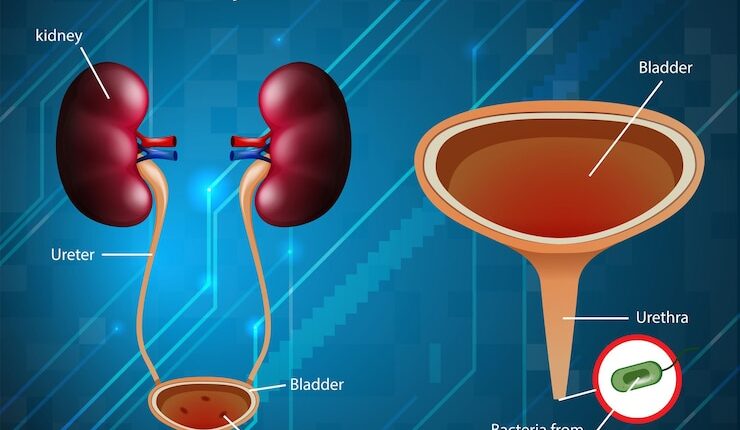A look at “How Harmful Is Urinary Tract Infection?” A urinary tract infection is a bacterial infection that can occur anywhere along the urinary tract. The urinary tract includes the kidneys, ureters, bladder, and urethra. While a UTI is not usually considered a serious health concern, it can cause serious problems if left untreated.
If you think you may have a UTI, it’s important to see a doctor as soon as possible so that you can start treatment. In this blog post, we will explore the causes, symptoms, and treatment options for UTIs. We will also discuss some tips for preventing UTIs in the first place.

Table of Contents
What is Urinary Tract Infection?
Urinary tract infection (UTI) is an infection that can occur in any part of the urinary system, including the kidneys, ureters, bladder, and urethra. Most UTIs are caused by bacteria, such as Escherichia coli, that enter the urinary system through the urethra and multiply in the bladder.
Symptoms of a UTI may include:
- A burning sensation when urinating
- Frequent urination
- Strong-smelling urine
- Blood in the urine
- Pelvic pain (in women)
If left untreated, a UTI can spread to the kidneys and cause more serious health problems.
Causes of Urinary Tract Infection
There are many different causes of urinary tract infections, but the most common cause is bacteria. Bacteria can enter the urinary tract through the urethra, which is the opening at the end of the penis. Once bacteria enter the urethra, they can travel up to the bladder and cause an infection. Other causes of urinary tract infections include:
- Dehydration: When your body is dehydrated, your urine becomes concentrated and more likely to contain bacteria.
- $exual intercourse: $exual intercourse can introduce bacteria into the urethra and increase your risk of developing a UTI.
- Pregnancy: Pregnant women are more susceptible to UTIs because of the changes in their bodies during pregnancy.
- Menopause: Menopause can cause changes in a woman’s urinary tract that make it more prone to infection.
- Certain medical conditions: Some medical conditions, such as diabetes and kidney stones, can increase your risk of developing a UTI.
Symptoms of Urinary Tract Infection
Urinary tract infections are usually diagnosed based on symptoms and a urinalysis. The most common symptom is a strong, persistent urge to urinate. Other symptoms may include:
- A burning sensation when urinating
- Frequent urination, especially at night
- Cloudy or bloody urine
- Strong-smelling urine
- Pelvic pain in women
Treatment for Urinary Tract Infection
When it comes to treating a UTI, there are a few different options available. The most common and recommended course of treatment is to take antibiotics. Antibiotics help to kill the bacteria that are causing the infection.
There are a few different types of antibiotics that can be used to treat a urinary tract infection. The type of antibiotic that is used will depend on the severity of the infection and the patient’s individual health history. Some common antibiotics that are used to treat urinary tract infections include amoxicillin, ciprofloxacin, and levofloxacin.
In some cases, home remedies may be enough to help treat a urinary tract infection. Drinking plenty of fluids, especially water, can help flush out the bacteria from your system. Cranberry juice has also been shown to be effective in treating urinary tract infections. Taking a probiotic supplement may also be helpful in preventing future infections.
Prevention of Urinary Tract Infection
Urinary tract infection (UTI) is a common infection that can affect anyone. Although UTI is not usually a serious condition, it can cause serious complications if left untreated.
The best way to prevent UTI is to drink plenty of fluids, especially water, and urinate frequently. Avoid holding in your urine for long periods of time. Drink cranberry juice or take cranberry supplements daily. Wipe from front to back after using the toilet. Use condoms during sexual intercourse. And lastly, empty your bladder immediately after $ex.
When to see a doctor
If you think you might have a UTI, it’s important to see a doctor as soon as possible. The sooner you get treatment, the less chance there is of the infection spreading or causing serious damage.
Urinary tract infections can cause serious pain and discomfort, so it’s important to get them treated early. If you have any of the following symptoms, it’s time to see a doctor:
- A strong and persistent urge to urinate
- Discomfort or pain while urinating
- Urinating more frequently than usual
- Cloudy or bloody urine
- Strong-smelling urine
- Pain in the lower abdomen or back
Final Note
UTIs are one of the most common types of infections, and usually occur when bacteria from the rectum or vagina enter the urethra. While UTIs are not usually serious, they can be very painful and uncomfortable. If left untreated, a UTI can lead to more serious health problems such as kidney infection. Therefore, it is important to see a doctor if you think you might have a UTI.









